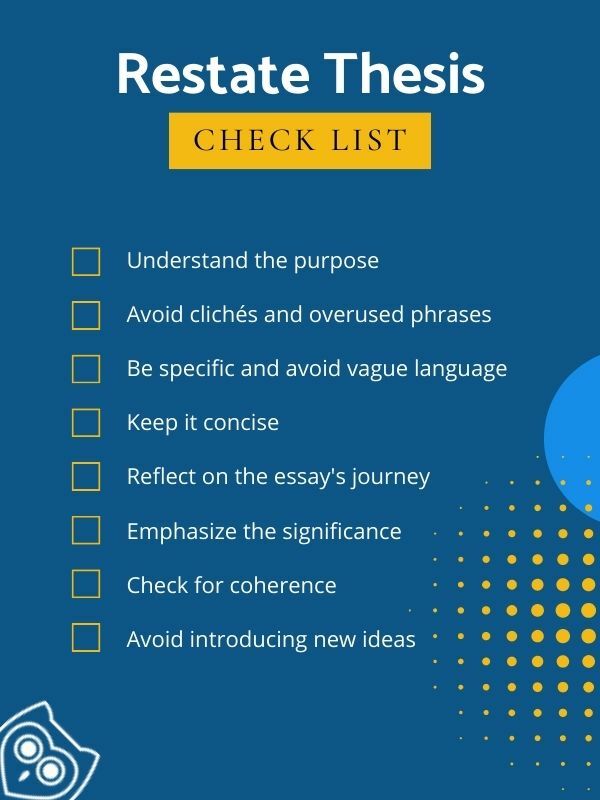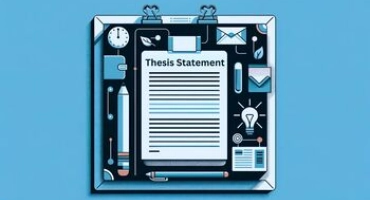How to Restate a Thesis
Table of contents
A thesis statement guarantees that your essay will be read, and a paraphrased thesis states that the main points of your essay will be remembered. Students have already heard about the importance of formulating a thesis statement to interest the reader in your written work. If you struggle with this crucial opening sentence, finding someone to write my thesis statement can ensure a strong foundation for your paper. However, inexperienced authors often forget to restate the thesis.
The purpose of the successful thesis restatement is to reinforce the essay’s main idea. This way, you intensify the original argument and influence the reader’s mind. For your research paper to be convincing, it must be coherent. For this reason, the thesis and the restated thesis should not contradict but complement each other.
In this article, detailed instructions will help you restate your thesis and make your essay memorable. Our experienced specialists are ready to share with you the most working strategies for high-quality rewording of the thesis. Moreover, we want to make it easier for you and have created a checklist of the necessary details to consider to restate your thesis effectively.
Understanding the Purpose of Restating a Thesis
We remind you that the thesis statement is a claim that summarizes the main idea of your essay. It is often used as the first sentence in the introductory paragraph to dedicate the reader to the context of the written work. However, a good thesis statement is not limited to the first paragraph. In academic and persuasive writing, for example, there is a need to restate the original thesis to maintain coherence.
What does restate thesis mean? Let’s start with the fact that a restated thesis is a statement based on the original thesis used in the concluding paragraph or throughout the body paragraphs. Quoting the original thesis statement word by word will not be effective, so you have to analyze the original meaning and reword it. You may use a paraphrasing tool in case you struggle with an issue of how to restate a thesis.
You must be wondering why restating a thesis statement in the conclusion paragraph is so important. It is sometimes difficult for the reader to follow your thought course while reading. Remember when you read a book, then by the last page, you begin to forget about what happened at the beginning. To regularly refresh the reader’s memory of your argument, you need to recall it by restating the original thesis statement in the essay’s conclusion paragraph and body paragraphs.
Thus, the thesis claim should permeate your essay. Each part should contain a reminder of the central idea to reinforce the perceived significance of the thesis word. The restated thesis acts as a link between the main components of your essay. It’s necessary to restate the thesis in conclusion, connect it with topic sentences and provide a logical analysis flow.
Strategies for Restating a Thesis Effectively
Unfortunately, a simple understanding of the importance of restructuring the thesis is insufficient. It is also necessary to understand the primary strategies for good restating. If you’re unsure how to restate your thesis effectively, you can order essay assistance from experts who have prepared a list of helpful examples for you.
The most effective strategies are:
Paraphrasing.
Reword your original thesis statement using different words and changing the sentence structure. With this technique, the form changes, but not the main point.
Initial thesis: The desegregation of public schools is considered to be the key purpose of the Civil Rights Movement.
Restatement: The anti-segregation movement in America was aimed at equalizing public schools.
Summarizing.
In this technique, you should analyze and summarize the overall meaning of the original point in the introduction. Thus, the statement will be concise and informative.
Initial thesis: Increased anxiety and stress exposure by the mother during pregnancy can negatively affect the intrauterine development of the child, making his nervous system more vulnerable to stress.
Restatement: A pregnant mother’s stress can make a child more anxious.
Reflecting.
Link your restated thesis to the ideas you uncovered in the body paragraph of the paper.
Initial thesis: The opportunities for women to develop professionally were historically equal to the career prospects of men, or were they?
Restatement of thesis: In the nineteenth century, the inequality in the career opportunities of the two sexes was drastic.
Significance.
Emphasize that the thought you expressed in the original thesis statement is so crucial that it is worth developing in restating the thesis.
Initial thesis: The lack of sex education in schools and families leads to increased unwanted pregnancies among adolescents.
Restatement: Again, 50% of pregnancies among teenagers are unwanted. As a result of the lack of sex education, the total number of teenage pregnancies continues to grow.
Rhetorical Devices.
Use rhetorical techniques in your thesis statement, such as parallelism and repetition, to enhance the persuasiveness of the paper and rephrase the original contribution.
Initial thesis: The film provides a detailed picture for our eyes.
Restatement: The film provides a detailed picture for our eyes, and a book provides an even more detailed image for our mind.
Emotional Appeal.
Use a moving phrase or concept to appeal to the reader’s emotions to enhance interaction. If you don’t know how to apply this technique, try asking for help with college papers, and get expert help.
e.g. How long must pass before people realize that their grandchildren will suffer from the consequences of environmental disasters.
Call to Action.
Formulate your paper’s central argument, and motivate the reader to take action by introducing a thesis restatement in the conclusion.
Example: Do not delay, nature needs your intervention right now, sort garbage responsibly!
Broader Context.
Explain to the reader the background of your thought.
Example: Initial thesis: The world was a millimeter far from a nuclear war.
Restatement: In the 20th century, the development of the nuclear industry reached such a level that the advanced countries were on the verge of starting a nuclear war.
Engaging Language.
Use vocabulary that is close and understandable to the reader.
Example: Lack of sleep is the major reason for heart diseases, so don’t worry, go take a nap!
Memorable Statement.
A powerful version of your original claim has a good potential to be remembered by readers.
Example: Realizing that you owe nothing to anyone is difficult, but only by recognizing this do you begin to live for real.
Checklist to help you ensure an effective restatement of your thesis

Now that you’re familiar with working strategies for paraphrasing a thesis statement, as well as with illustrative examples, it’s time to stock up on all the tips from our experienced writers. We have created a checklist of eight points you need to follow to know how to write a thesis statement for the conclusion section so that most professors truly value your writing.
Understand the purpose of restatement
Understanding the reasons and motivation for your actions gives you the key to rephrase a thesis right. Having realized the primary goal of restating your thesis statement will help you articulate it more clearly. Remember that this writing technique exists to strengthen your arguments and improve their perception by readers. So let’s see how to restate a thesis for your conclusion and write a perfect paper.
Avoid clichés and overused phrases
The reader will not be interested in hackneyed formulations, absolute statements, and overused concepts in your thesis restatement. Our brain always demands novelty, so unique information will attract more attention and arouse interest in your research paper. Try to make your thesis restatement look fresh and intriguing.
Be specific and avoid vague language
Vague concepts, conditional language, overly long sentences, and oversimplification of information will make your thesis statements more boring. Do not think that your reader is a fool. On the contrary, provide him with food for thought. Also, reconsider the sentence structure, for it not to be too weary, use different words to be diverse.
Keep it concise
An excellent conclusion thesis restatement should be concise, giving only the most necessary context to make it easier to understand. You can expand on your idea in more detail in the following main paragraphs. To get a perfect reworded thesis, use the thesis statement generator to make the process easier. Still, to make rephrasing effective, it should be concise, write shorter sentences and use different words.
Reflect on the essay’s journey
Summarize your main ideas. After all, the thesis restatement is precisely the information you want the reader to remember the most. Why don’t you recall once again the main points and central claims of your writing? Use grammar tenses to convey your point. Perhaps your original statement was written in the present or future tense, then use past tense to show you’ve accomplished your ideas. Or, at the beginning of your writing, you used a sentence with a subject. So, restate the thesis in the conclusion with a prepositional phrase instead.
Emphasize the significance
Your opinion and your words must be heard. Emphasize the importance of your ideas with a strong conclusion paragraph thesis restatement. Choose the right strategy for your body paragraphs and paper’s conclusion to sound more convincing. Restate the thesis so that the reader has no doubts regarding the expertise of your writing and the words you say.
Check for coherence
Do not forget about the connection between the thesis sentence in the introduction paragraph and the restatement in the essay conclusion section and the main body. Follow the logic of the presentation of your thoughts when you restate claim. Your paper should not contain contradictory words and statements.
Avoid introducing new ideas
New and creative ideas are good, but they should be pre-planned as part of your paper. An unexpected and unforeseen conclusion that isn’t related to the research problem can confuse the reader at the end of the essay. Stick to your original concepts and the same meaning for the coherence of your writing. Rewrite existing concepts to reinforce your introduction thesis statement.
A thesis statement is an effective technique for attracting the attention of the reader, as well as ensuring his interest. However, using a thesis statement only in the introductory paragraph will not provide you with the desired result. For a more comprehensive result, you will have to rephrase a thesis statement a few more times in the writing process. If the complex demands of structuring and coherence are too challenging, you might consider professional help and ask someone to write my college essay for me instead of struggling alone.
No strong conclusion is complete without a good reworded thesis. Remember to connect the rephrasing to the main research question. Use our strategies to write an effective thesis and get a well-deserved assessment from the teacher. Stick to our recommendations to make your paraphrased thesis effective.







